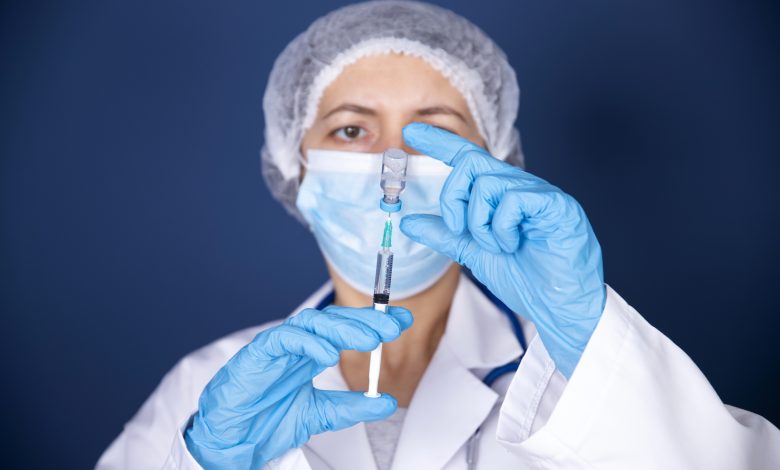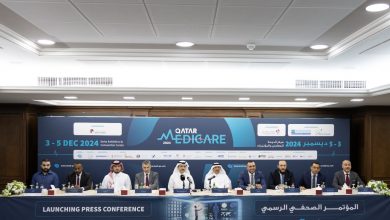
COVID-19 vaccines 98.4% effective: Dr. Muna Al-Maslamani
د. منى المسلماني: لقاحات كوفيد-١٩ فعالة بنسبة ٩٨،٤٪
Al-Sharq – WGOQatar Translations
Doha: Dr. Muna Al-Maslamani, Medical Director of the Center for Transitional Diseases, confirmed that 98.4% of those vaccinated with Pfizer/BioNTech and Moderna vaccines did not get coronavirus infection and that only 1.5% of those vaccinated were infected either after receiving the first or second dose.
“Pfizer/BioNTech and Moderna vaccines cover, according to manufacturers, new, mutated strains coming from Britain and South Africa,” dr. Al-Maslamani said during the Social Distance program on Qatar TV, noting that we need further studies in this regard.
“Given the statistics, more than 400,000 people in Qatar have received the vaccine from the beginning of the national vaccination campaign until March 28th, 98.4% have not been infected with COVID-19, and only 1.5% have been infected either after receiving the first or second dose,” she said regarding what is being circulated on social media about people getting infected after receiving the vaccine.
On cases requiring hospitalization in the critical cases unit, she explained: “In January, the number of cases hospitalized in the acute unit was monitored and was about 7,796 of which only 57 from vaccine recipients , and for cases that entered intensive care in January, there were 1,160 cases, of which only 7 were from vaccine recipients.”
On the duration of vaccine effectiveness, Dr. Al-Maslamani said: “The preliminary study indicates that the effectiveness of vaccines in the formation of antibodies lasts for 6 months, but I do not expect their effectiveness to stop at this time, because companies follow patients vaccinated and conduct studies, and we await these studies from them, which include answering questions; will the effectiveness of vaccines be extended to a year or not? Is it possible for Corona to become a seasonal virus such as seasonal influenza and therefore requires an annual vaccine?”
Dr. Al-Maslamani invited members of the community who had previously been infected with Coronavirus to donate plasma to the Transitional Disease Center. “We are suffering from plasma deficiency and we need donors, as acute cases in intensive care require plasma treatment, especially those with liver or kidney function disorders,” she said
الشرق
الدوحة: أكدت الدكتورة منى المسلماني، المدير الطبي لمركز الأمراض الانتقالية أن 98.4% ممن تلقوا التطعيم بلقاحي “فايزر/بيونتيك وموديرنا” لم يصابوا بفيروس كورونا “كوفيد -19″، وأن 1.5% فقط ممن تم تطعيمهم قد أصيبوا بالعدوى سواءً بعد تلقي الجرعة الأولى أو الثانية.
وقالت د. المسلماني خلال استضافتها في برنامج المسافة الاجتماعية على تلفزيون قطر، إن لقاحي “فايزر/بيونتيك وموديرنا” يغطيان –وفق الشركات المصنعة- السلالات الجديدة المتحورة القادمة من بريطانيا وجنوب أفريقيا، مشيرة إلى أننا نحتاج إلى المزيد من الدراسات في هذا الصدد.
وحول ما يتداوله البعض عبر مواقع التواصل الاجتماعي بشأن حالات الإصابة بعد تلقي اللقاح، قالت د. المسلماني: بالنظر إلى الإحصائيات فإن أكثر من 400 ألف شخص في قطر قد تلقوا اللقاح منذ بداية الحملة الوطنية للتطعيم حتى 28 مارس الماضي، و 98.4% منهم لم يصابوا بفيروس كورونا “كوفيد -19″، و 1.5% فقط أصيبوا بالعدوى سواءً بعد تلقي الجرعة الأولى أو الثانية.
وحول الحالات التي تستدعي الدخول إلى المستشفى في وحدة الحالات الحرجة، أوضحت: “في يناير الماضي تم إجراء مراقبة عدد الحالات التي أدخلت المستشفى في وحدة الحالات الحادة وكانوا حوالي 7796 حالة منهم 57 حالة فقط ممن تم تطعيمهم باللقاح، وبالنسبة للحالات التي دخلت العناية المركزة في شهر يناير فكانت 1160 حالة منهم 7 حالات فقط من المطعمين”
وبشأن مدة فعالية اللقاحات، قالت د. المسلماني: “الدراسة المبدئية تشير إلى أن فعالية اللقاحات في تكوين أجسام مضادة تستمر لمدة 6 شهور، لكنني لا أتوقع أن تقف فعاليتها عند هذه المدة، لأن الشركات تتابع المرضى المطعمين وتجري الدراسات، ونحن ننتظر هذه الدراسات منهم والتي تشمل الإجابة عن التساؤلات؛ هل سيتم مد فترة فعالية اللقاحات حتى سنة أم لا؟ وهل من الممكن أن يتحول كورونا إلى فيروس موسمي مثل الإنفلونزا الموسمية وبالتالي يحتاج لقاحي سنوي؟”.
ووجهت د. المسلماني الدعوة إلى أفراد المجتمع ممن أصيبوا سابقاً بفيروس كورونا إلى التبرع بالبلازما في مركز الأمراض الانتقالية.. وقالت: نحن نعاني من نقص البلازما ونحتاج متبرعين، فالحالات الحادة في العناية المركزة تستدعي العلاج بالبلازما خاصة تلك التي تعاني من اضطراب في وظائف الكبد أو الكلى”.
المصدر: al-sharq



